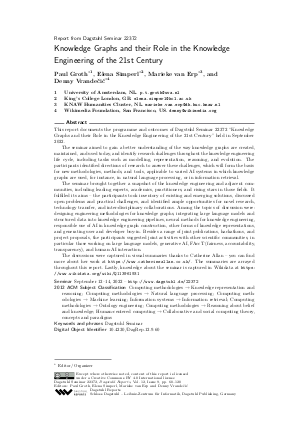Knowledge Graphs and their Role in the Knowledge Engineering of the 21st Century (Dagstuhl Seminar 22372)
Authors Paul Groth, Elena Simperl, Marieke van Erp, Denny Vrandečić and all authors of the abstracts in this report
-
Part of:
Issue:
Dagstuhl Reports, Volume 12, Issue 9
Part of: Volume: Dagstuhl Reports, Volume 12
Part of: Journal: Dagstuhl Reports (DagRep) - License:
 Creative Commons Attribution 4.0 International license
Creative Commons Attribution 4.0 International license
- Publication Date: 2023-04-04
File

PDF
DagRep.12.9.60.pdf
- Filesize: 11.69 MB
- 61 pages
Document Identifiers
Subject Classification
ACM Subject Classification
- Computing methodologies → Knowledge representation and reasoning
- Computing methodologies → Natural language processing
- Computing methodologies → Machine learning
- Information systems → Information retrieval
- Computing methodologies → Ontology engineering
- Computing methodologies → Reasoning about belief and knowledge
- Human-centered computing → Collaborative and social computing theory, concepts and paradigms
Keywords
- Dagstuhl Seminar
Metrics
- Access Statistics
-
Total Accesses (updated on a weekly basis)
0PDF Downloads0Metadata Views
Abstract
This report documents the programme and outcomes of Dagstuhl Seminar 22372 "Knowledge Graphs and their Role in the Knowledge Engineering of the 21st Century" held in September 2022. The seminar aimed to gain a better understanding of the way knowledge graphs are created, maintained, and used today, and identify research challenges throughout the knowledge engineering life cycle, including tasks such as modelling, representation, reasoning, and evolution. The participants identified directions of research to answer these challenges, which will form the basis for new methodologies, methods, and tools, applicable to varied AI systems in which knowledge graphs are used, for instance, in natural language processing, or in information retrieval. The seminar brought together a snapshot of the knowledge engineering and adjacent communities, including leading experts, academics, practitioners, and rising stars in those fields. It fulfilled its aims - the participants took inventory of existing and emerging solutions, discussed open problems and practical challenges, and identified ample opportunities for novel research, technology transfer, and inter-disciplinary collaborations. Among the topics of discussion were: designing engineering methodologies for knowledge graphs, integrating large language models and structured data into knowledge engineering pipelines, neural methods for knowledge engineering, responsible use of AI in knowledge graph construction, other forms of knowledge representations, and generating user and developer buy-in. Besides a range of joint publications, hackathons, and project proposals, the participants suggested joint activities with other scientific communities, in particular those working on large language models, generative AI, FAccT (fairness, accountability, transparency), and human-AI interaction. The discussions were captured in visual summaries thanks to Catherine Allan - you can find more about her work at https://www.catherineallan.co.uk/. The summaries are arrayed throughout this report. Lastly, knowledge about the seminar is captured in Wikidata at https://www.wikidata.org/wiki/Q113961931
Cite As Get BibTex
Paul Groth, Elena Simperl, Marieke van Erp, and Denny Vrandečić. Knowledge Graphs and their Role in the Knowledge Engineering of the 21st Century (Dagstuhl Seminar 22372). In Dagstuhl Reports, Volume 12, Issue 9, pp. 60-120, Schloss Dagstuhl – Leibniz-Zentrum für Informatik (2023)
https://doi.org/10.4230/DagRep.12.9.60
BibTex
@Article{groth_et_al:DagRep.12.9.60,
author = {Groth, Paul and Simperl, Elena and van Erp, Marieke and Vrande\v{c}i\'{c}, Denny},
title = {{Knowledge Graphs and their Role in the Knowledge Engineering of the 21st Century (Dagstuhl Seminar 22372)}},
pages = {60--120},
journal = {Dagstuhl Reports},
ISSN = {2192-5283},
year = {2023},
volume = {12},
number = {9},
editor = {Groth, Paul and Simperl, Elena and van Erp, Marieke and Vrande\v{c}i\'{c}, Denny},
publisher = {Schloss Dagstuhl -- Leibniz-Zentrum f{\"u}r Informatik},
address = {Dagstuhl, Germany},
URL = {https://drops.dagstuhl.de/entities/document/10.4230/DagRep.12.9.60},
URN = {urn:nbn:de:0030-drops-178105},
doi = {10.4230/DagRep.12.9.60},
annote = {Keywords: Dagstuhl Seminar}
}
